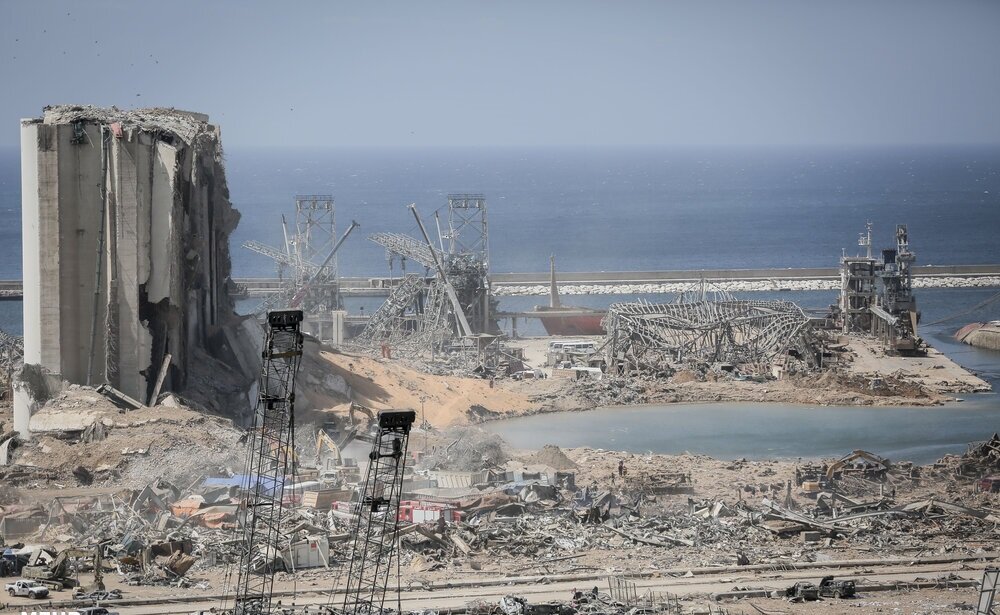Revealed: The role of some Arab countries in Beirut port explosion

TEHRAN - A new report by “Rai Al-Youm” about the investigations into the port of Beirut explosion reveals that a bank account based in a Gulf capital and its main branch in Switzerland financed the ship and personalities affiliated with the future introduced nitrates without Hariri’s knowledge. The results of the port’s investigations will not be published as it is part of the black box of the war in Syria.
The investigation into the last year’s explosion in the port of Beirut is still kept secret, and the Lebanese judicial authorities have been keen not to publish anything about this investigation. The investigation is supposed to answer the questions that preoccupied Lebanese public opinion since the first day of Beirut’s shaking and destruction.
The most important of these questions revolve around who brought the ammonium nitrate to the port of Beirut? Who owned the ship?
Since the explosion, the Secretary-General of Hezbollah Sayyed Hassan Nasrallah has demanded the judicial investigator in three letters to publish the results of the technical investigation to the Lebanese public opinion. He has said to the judge, “If you do not want to publish the investigation to the public opinion, at least gather the families of the port victims and tell them how their sons were martyred.”
But those demands from Sayyed Hassan Nasrallah did not resonate, and the investigation results were kept secret. The current investigative judge “Tariq Al-Bitar,” as the former judge “Fadi Sawan” preceded him, followed up the part related to job negligence in the explosion without details of what preceded the shipment. The first part, i.e., Job neglect, required a request to listen and investigate several parliamentarians, military commanders, and general managers, which caused a split in Lebanon, accusing the judge of discretion in summoning and politicization. Still, the judge concentrated on ministers who held the position in the period between the ship’s arrival and the explosion. He also chose the former Prime Minister “Hassan Diab” without summoning previous prime ministers who successively held the position during the presence of nitrates inside the port. These are questions and observations made by political parties and legal figures that Judge Bitar did not answer until now.
According to “Rai Al-Youm” sources, the investigation answers these questions regarding who brought the ship to Lebanon and for whom? The authorities talk about part of the investigations with broad headings without going into details. The sources report that the shipment was paid for from a bank account based in an arabian state in the Persian Gulf, with the main branch in Switzerland. The shipment was brought in by some figures in “the Future Movement,” without the knowledge of Saad Hariri.
The sources suggested that the nitrates were stored in the port and were due to transport into Syrian territory to benefit terrorist groups stationed on the Syrian-Lebanese border. At that time, some of the materials remained neglected in ward No. 12 in the port.
It appears that the ship, its owners, and the shipment route were included within the “black box” of the war in Syria, which was forbidden with strict international and regional support, not to disclose or publish facts of the Syrian conflict. Including the parties involved in it, how weapons and terrorists transferred, and their financing for that.
According to “Rai Al-Youm,” there is not a single evidence against “Hezbollah” in the investigations, and that the accountability framework will be limited to those directly responsible for negligence. Information indicates that the judge was heading to close the file and issue the indictment, but the prosecution insisted on listening to former President Michel Suleiman, and former Prime Minister Tammam Salam, before giving the decision presumptive.
The investigation into the port explosion will likely reach a clear conclusion for public opinion, and legal accountability, unlike other files that remain pending without conclusions.
